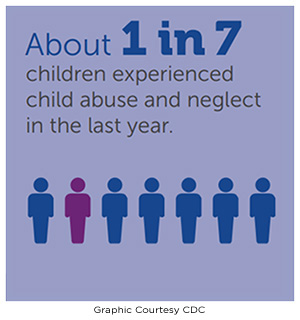Protect our children: Join the fight against child abuse

At least 1 in 7 children1 have experienced child abuse or neglect over the past year in the United States, according to the Centers for Disease Control and Prevention (CDC). This is likely an underestimate because many cases are unreported. Child abuse and neglect are preventable, and everyone has a role to play in protecting our children.
April is designated as National Child Abuse Prevention Month with the aim of combating child abuse and neglect in all its forms, including physical, emotional, sexual, and online exploitation.
The Child Abuse Prevention and Treatment Act (CAPTA) defines child abuse and neglect as, at a minimum:
- “Any recent act or failure to act on the part of a parent or caretaker, which results in death, serious physical or emotional harm, sexual abuse or exploitation”; or
- An act or failure to act which presents imminent risk or serious harm.” 2
The best way to protect children from abuse, and protect yourself, staff, volunteers, and organization from allegations of child abuse, is to prevent abuse and neglect before it happens. A single allegation of child abuse, whether it proves true, is a severe reputational risk to your organization.
While most child caregivers prioritize safety and development, organizations must be vigilant. Child sexual abuse (91%) often occurs within trusted relationships, underscoring the need for preventive measures.1 Potential abusers may seek opportunities with access to children, making proper precautions crucial.
Be Part of the Solution: Actions Organizations Can Take
Most organizations have a written zero-tolerance abuse policy, compliant with state mandated reporting laws. To adequately protect the children you support, it’s important to establish strong protocols that are specific to your organization’s programs to help prevent, detect, and respond to abuse. To improve the effectiveness of your abuse prevention efforts, your organization must take these actions:
- Move Beyond a Zero Tolerance Policy: Key elements to an Abuse Prevention Program involve the following elements specific to your organization:
- Awareness: Educating children, parents, staff, and volunteers about the signs, risks, and consequences of child abuse and how to report it.
- Prevention: Providing strategies and resources to prevent child abuse from occurring, such as screening, training, policies, and protocols.
- Intervention: Responding, investigating, and reporting child abuse allegations and disclosures promptly and appropriately and providing support and referrals to victims and families.
- Evaluation: Measuring the effectiveness and impact of the child abuse prevention program and making improvements as needed. This becomes crucial following an incident.
- Develop Mandated AND Internal Reporting Protocols:If anyone within the organization suspects that a child is being abused, they should immediately follow their legally mandated reporting protocols. However, our experience shows that many organizations stop there. Every organization should also establish their own internal reporting protocols. These protocols should be clearly outlined within the abuse policy and visibly posted within the organization. By doing so, incidents can be investigated internally, leading to better prevention of future occurrences.
- Make the Call – The Power of Reference Checks: While completing criminal background checks is standard practice for employee screening and selection, it’s essential to recognize their limitations. Notably, such checks often fail to identify most sexual offenders due to their prior offenses going undetected. Studies have found that many sex offenders were found to have committed many sexual offenses prior to being caught or arrested.3
Speaking with references offers objective insights into a candidate’s suitability for a role. It serves as a safety net, catching any signs of incompatibility between the individual and the organization. Remember, an inability to provide credible references warrants further investigation. Reference checks unveil details about the applicant’s work history, volunteer experience, education, and character traits. When conducting these checks, listen attentively for any red flags. And always follow the best practice of thoroughly documenting your findings.
- Live the Code of Conduct: Many organizations establish a basic Code of Conduct that defines expected behaviors and responsibility of staff, volunteers, and visitors. Clear boundary violations must be listed by defining guidelines for appropriate and inappropriate actions and behaviors when interacting with vulnerable populations like children.
Remember, a Code of Conduct isn’t just a document; it’s a living commitment to child safety. Having regular daily dialogue and understanding how these ‘boundary violations’ play out in day-to-day interactions are what truly make a difference. When consistently followed and ‘lived’, it fosters a culture of vigilance and accountability within the organization.
Abusers are rarely caught in the act; instead, we detect them when they break the rules. Every report, even minor policy violations, demands serious attention. Swift action must follow, and meticulous documentation should be securely maintained.
- Effective Training is Powerful: While state specific mandated reporting training is imperative, a strong abuse prevention training program should include an overview of your organization’s Abuse Prevention Program, internal reporting strategies, investigation, and resolution procedures. Other important elements are training on how to recognize and respond to abuse risks from grooming, peer-on-peer abuse, one-on-one interactions, social media, and proper consent.
Seize the Moment: Take Your Prevention Efforts to The Next Level
During Child Abuse Prevention Month, use this as an opportunity to assess your existing Abuse Prevention Program to enhance and elevate the effectiveness and quality of your program’s policies and procedures.
The following resources are available to Nationwide customers who have access to a range of free risk management resources, programs, and discounted products/services on MyLossControlServices.com:

Main components of an abuse, neglect, and exploitation prevention program:
- A high-level overview addressing (the framework for) an effective abuse, neglect and exploitation prevention and detection program.
Intellicorp background screening:
- Employment verification services (criminal, prior work history, education); allow employers to screen applicants to help minimize risk and determine the quality of new hires.
- A user-friendly tool to help identify risks to human service organizations and develop basic risk-control management plans to address their unique needs. For more information or access, contact your Nationwide Loss Control Services associate or email us at lcs@nationwide.com.
Everyone has a role in supporting children and families to prevent child abuse and neglect. In addition to the resources listed above, there are many resources and services available to support these initiatives found at the Children's Bureau within the U.S. Department of Health and Human Services.
1 https://www.cdc.gov/violenceprevention/childabuseandneglect/fastfact.html
2 CAPTA Reauthorization Act of 2010 (P.L. 111-320), 42 U.S.C. § 5101, Note (§ 3)
3 Chapter 5: Adult Sex Offender Recidivism | Office of Sex Offender Sentencing, Monitoring, Apprehending, Registering, and Tracking (ojp.gov)
